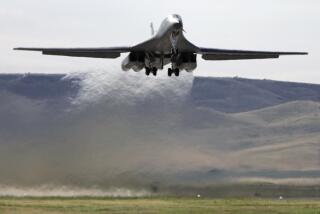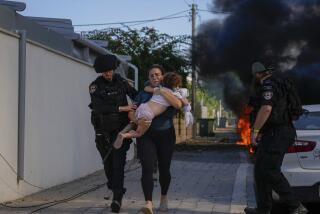U.S. Pilots Charged in Airstrike
- Share via
WASHINGTON — The Air Force has charged two F-16 pilots with involuntary manslaughter and aggravated assault for their roles in a bombing that killed four Canadian soldiers in Afghanistan, the service said Friday. It is the first time the military has leveled criminal charges related to a “friendly fire” incident in wartime.
The pilots, both members of an Illinois Air National Guard unit in Springfield, have been recalled to active duty to face the charges in military court, the Air Force said.
Majs. Harry Schmidt and William Umbach each were charged Wednesday with four counts of manslaughter and eight counts of aggravated assault as well as dereliction of duty. Schmidt dropped the 500-pound bomb that caused the deaths; Umbach was his flight commander in charge of their mission.
The dead men were the first Canadian soldiers killed in a combat zone since the Korean War. The April attack, which also injured eight Canadians, was one of the worst such incidents in the war in Afghanistan. No one has been charged in a December incident in which three Green Berets and about 25 of their Afghan allies were killed in an accidental bombing near the southern city of Kandahar.
The decision to file criminal charges follows months of controversy over the bombing, which was protested vigorously by the government of Canada, one of the United States’ staunchest allies. The Canadian and U.S. militaries investigated the incident.
If convicted on all the charges, Schmidt faces a maximum sentence of 64 years and six months, and Umbach of 64 years and three months, said Maj. Ted Wadsworth, a Pentagon spokesman.
Only once before has a U.S. service member been charged in relation to a friendly fire incident. In that case, the peacetime downing of two Army Black Hawk helicopters over northern Iraq by an Air Warning and Control System aircraft in April 1994, a radar officer was acquitted of all charges.
Military legal analysts said the unprecedented nature of the charges in wartime raised questions about whether they may have resulted from diplomatic or political pressure.
“I’m not trying to exonerate these men, but given all the bombing that was going on [in Afghanistan] of civilians and of our own troops, you have to ask yourself, why are these guys being singled out? What’s different about what they did than what the other pilots have done? And the answer is, they killed foreign troops from an ally,” said Francis A. Boyle, a professor of international law and expert on the laws of war at University of Illinois College of Law, in Champaign.
The charges are also unusual because both pilots are National Guardsmen who had been called up temporarily for duty in Afghanistan. Critics of the increased demands being placed on members of the reserves and National Guard in the last decade have speculated that some reserve pilots may not have the same levels of training or experience as their active-duty counterparts.
But Schmidt and Umbach were seasoned combat pilots. Schmidt, who dropped the laser-guided bomb after seeing what looked to him like flashes of gunfire, is a former Navy F/A-18 Hornet pilot and a former F-15 instructor pilot at the Navy’s elite Top Gun weapons school. Umbach is a United Airlines pilot who flew F-16 sorties on weekends.
Both are members of the 183rd Fighter Wing of the Illinois Air National Guard and were temporarily assigned to the 332nd Air Expeditionary Group when the incident occurred.
Charles W. Gittins, a Virginia lawyer representing Schmidt, said in a statement that although his client “regrets” that Canadian troops were killed and injured, he “honestly and reasonably believed” he was acting in self-defense.
The statement noted the unprecedented nature of the charges. “Unfortunately, this action may have the unintended effect of causing unnecessary American casualties in the future as combat air crews may hesitate to exercise their right of self-defense,” it said. The charges, it said, may be driven by “an inappropriate political agenda.”
Umbach and his lawyer could not be reached for comment.
Lloyd Smith, the father of Nathan Smith, one of the Canadian soldiers killed while participating in a nighttime training exercise near Kandahar, said Friday from his home in Tatamagouche, Nova Scotia, that he is not interested in revenge, but accountability.
“I can’t bring him back, so the best I can do in his memory is to make sure that it can’t happen again, “ Smith said.
A military investigation into the bombing released in its entirety for the first time Friday found that Schmidt thought he was under attack from the ground when he dropped the bomb. But instead of leaving the area to assess the threat and plan a possible counterstrike, as procedures dictate, Schmidt and the pilot of a second plane rushed to attack, the investigation found.
In fact, a radar plane alerted Schmidt that “potential friendlies were in the area,” but the warning came too late--seconds after Schmidt had declared he was firing in self-defense and dropped the bomb, the inquiry found.
A Canadian investigation found that muzzle flashes from the training mission by the Canadian soldiers were so far below the U.S. pilots that they posed “no threat.”
Canadian officials declined to comment on the charges Friday. A statement released by Canadian Defense Minister John McCallum praised the work of the U.S. and Canadian investigative bodies.
“We had a very good working relationship with American authorities throughout the entire process,” McCallum said in the statement.
The case is being reviewed by Lt. Gen. Bruce Carlson, commander of the 8th Air Force. He has three main options: dismiss the charges, prosecute the men in a general court-martial, or convene a special court-martial in which the maximum penalty would be six months in jail and bad-conduct discharges, Wadsworth said.
If Carlson chooses a general court-martial, the charges would be heard first under Article 32 of the Uniform Code of Military Justice, which is similar to the grand jury process in civilian courts.
More to Read
Sign up for Essential California
The most important California stories and recommendations in your inbox every morning.
You may occasionally receive promotional content from the Los Angeles Times.










